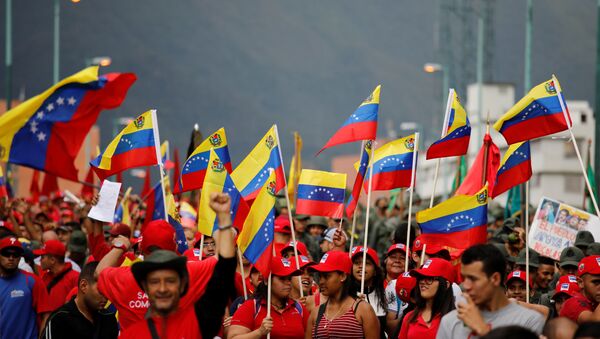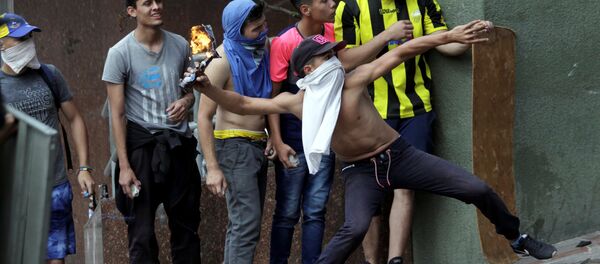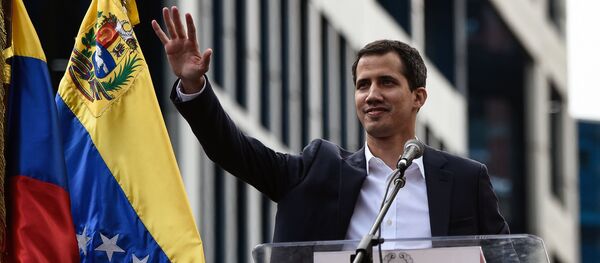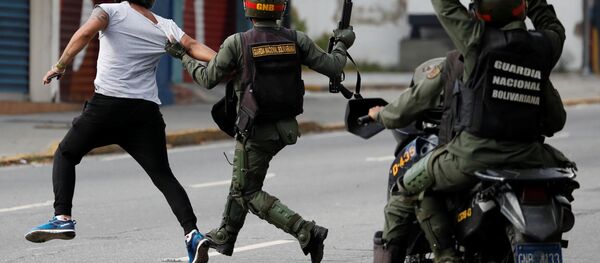The United States formally recognised Guaido and demanded that Venezuelan President Nicolas Maduro, whom it does not consider to be the legitimate head of state, should prevent violent actions against the opposition. Speaking to his supporters, Maduro declared himself the constitutional president, and called the opposition leader "the US puppet."
To date, Canada, Argentina, Brazil, Chile, Colombia, Costa Rica, Guatemala, Honduras, Panama, Paraguay and Peru, in addition to the United States, recognised Guaido as the country’s president.
READ MORE: How US-Venezuela Escalation Unfolded From Sanctions to Backing Anti-Maduro Coup
In the meantime, the residents of the Venezuelan capital of Caracas told Sputnik that the situation in the city was calm, following protests at night, people can walk the streets without any problems.
"The situation in the country is now generally calm. It is now 8 a.m. in Caracas [1200 GMT]. As for residents, it is calm now. Of course, what we saw yesterday was the dissatisfaction linked to the economic war that we, in Venezuela, are facing", Rosalba Lo Bue, the director of the Institute of Russian Language and Culture, said.
Lo Bue stressed that it was possible to walk the streets "without any problems".
Information about political instability in Venezuela is provided below.
On April 19, 2013, Maduro was sworn in as the president of Venezuela. He promised in his statements that the period of his government’s rule would be a time of economic prosperity, justice and peace.
Inflation in Venezuela at that time was the highest in Latin America, about 50 percent, while there was a shortage of goods in trade networks, where prices were tightly restricted by the government.
The president and the government of the country blamed the opposition and businessmen for this, while the latter cited currency restrictions and barriers to foreign economic activity as the reasons.
In late November 2013, the Venezuelan Economic Affairs Ministry officially ordered the introduction of preventive control in the network of electronic goods seller Daka, whose products had previously been confiscated and sold by the authorities for overpricing.
READ MORE: Russia Warns US Against Military Interference in Venezuela's Affairs
In February 2014, marches of supporters and opponents of the country’s president took place in various cities of Venezuela. People were killed, injured and detained as a result of the riots. Maduro stated that the unrest was an attempt to overthrow the government.
On December 6, 2015, as a result of the parliamentary elections, the Venezuelan opposition gained control over the parliament for the first time in 17 years, securing two-thirds of seats. With a qualified majority (from 100 mandates), the opposition can organize a non-confidence vote in the vice-president and members of the government.
The situation in Venezuela, the largest oil exporter in South America, has become critical amid a shortage of goods, galloping inflation and the fall in government revenues caused by the decline in oil prices, as well as an institutional crisis between the executive and legislative branches of the government.
In December 2016, the Venezuelan National Assembly recognized Maduro responsible for the crisis situation in the country.
In January 2017, the parliament declared that Maduro abandoned his post as a result of dereliction of duty. Maduro, in turn, accused the opposition parliament of a coup attempt. However, the Supreme Court of Justice stated that the National Assembly does not have the constitutional powers to remove Maduro from the presidency.
READ MORE: Venezuela Protests for 3d Day, Shots Replace Cooking Banging of Pots (VIDEOS)
In April 2017, Maduro announced country’s withdrawal from the Organization of American States (OAS), which refused to recognize his new presidential powers.
In August 2018, Maduro faced a failed assassination attempt.
On January 10, 2019, Maduro was sworn in for the second presidential term for the period from 2019 until 2025.
In early January 2019, Venezuela’s parliament elected its new head, Juan Guaido, who announced his intention to create a transitional authority to restore constitutional order, as well as a fund for the return of assets that had been seized from the country’s population with the use of corrupt means.
Anti-government protest marches against Maduro that started in Venezuela on January 21, 2019, with demonstrators banging against their pots and pans, have already sparked unrest that has spread throughout the whole country and claimed the lives of more than a dozen people.







